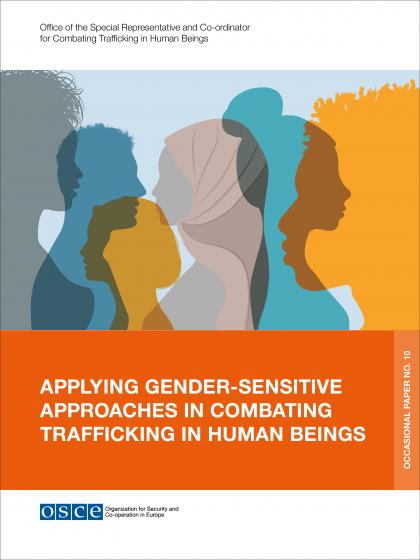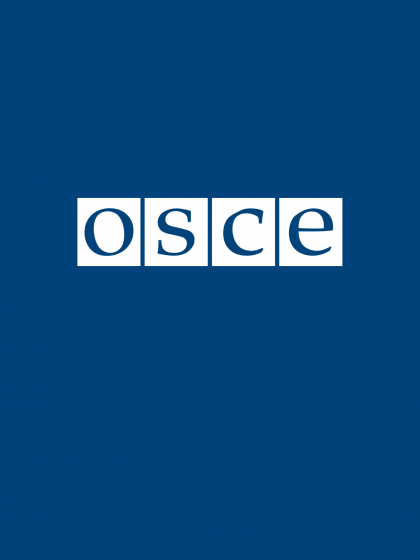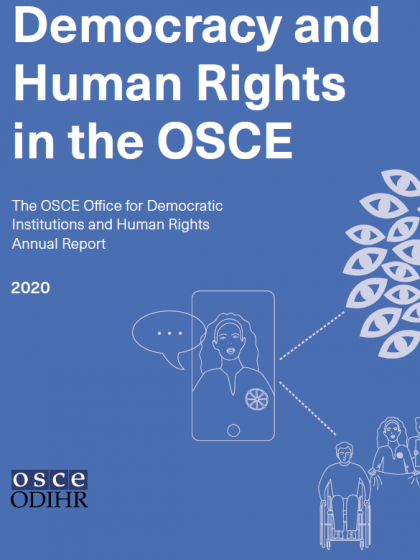Publications
Addressing Anti-Semitism through Education: Anti-Semitism and the Situation in the Middle East, Teaching Aid 10
Publishing date: 4 December 2019
Content type: Guide / manual / handbook
Where we are: OSCE Office for Democratic Institutions and Human Rights
What we do: Human rights, Tolerance and non-discrimination
Publisher: Organization for Security and Co-operation in Europe
This is one of a set of ten specialized teaching aids to support teachers to address anti-Semitism. These teaching aids offer guidance for responding effectively to challenging questions or behaviour from students, provide brief but essential background information on contemporary manifestations of Anti-Semitism, and signpost other useful resources for further reading.
Applying Gender-Sensitive Approaches in Combating Trafficking in Human Beings
Publishing date: 17 May 2021
Content type: Study / report
Where we are: Office of the Special Representative and Co-ordinator for Combating Trafficking in Human Beings
What we do: Combating trafficking in human beings
Publisher: Organization for Security and Co-operation in Europe
This Occasional Paper is based on findings from a multi-method research project, including surveys, expert interviews, and expert group meetings carried out with participants from more than half of the OSCE’s participating States. By bringing together the voices of survivors, anti-trafficking experts, service providers, and law enforcement, this paper offers a comprehensive account of gender aspects in trafficking in human beings. It also provides a basis for discussion about possible ways to apply gender-sensitive approaches. The report, therefore, explores a range of gender aspects that are often not addressed in existing prevention, protection, and prosecution strategies.
Gender Mainstreaming in Water Governance in Central Asia
Publishing date: 1 October 2020
Content type: Guide / manual / handbook
What we do: Environmental activities, Gender equality, Water management
Publisher: Organization for Security and Co-operation in Europe
The OCEEA strives to promote a gender perspective in its activities related to water governance and water diplomacy given the gender-specific impacts of water policies and the vast potential of the inclusion of gender in this field for more equitable and effective water management. The OCEEA has developed this guide to gender mainstreaming in water governance in Central Asia for the benefit of water practitioners in the region. Gender mainstreaming in water governance contributes to stability and security as it can lead to more effective policies and can work to reduce social imbalances and tension. When women and men equally decide on how to use water, decisions are better targeted and more representative of the needs of the entire population.
Mission to Skopje anti-rumour campaign Book
Publishing date: 14 July 2021
Content type: Brochure
Where we are: OSCE Mission to Skopje
What we do: Gender equality
Publisher: Organization for Security and Co-operation in Europe
A Booklet about: Watching Elections and Helping People with Disabilities take part in Elections
Publishing date: 20 May 2020
Collections: Election handbooks
Content type: Guide / manual / handbook
Where we are: OSCE Office for Democratic Institutions and Human Rights
What we do: Elections
Publisher: Organization for Security and Co-operation in Europe
The 1 billion people with disabilities around the world have diverse needs and views. People with disabilities must have the chance to take part in elections to have their needs and views represented. But they still face barriers during elections – from problems with physical accessibility to a lack of supported decision-making. They are under-represented as voters, candidates and politicians, as well as election administrators and observers. ODIHR observes elections to see if full participation is taking place in elections throughout the OSCE. Information gathered by observers can help people with disabilities to be better included in future elections. This new booklet provides easy-to-understand information about the rights of people with disabilities to take part in politics and elections and how they can be observed.
Trafficking in Human Beings and Terrorism: Where and How They Intersect
Publishing date: 8 July 2021
Content type: Study / report
Where we are: Office of the Special Representative and Co-ordinator for Combating Trafficking in Human Beings
What we do: Combating trafficking in human beings
Publisher: Organization for Security and Co-operation in Europe
This paper explores the intersections between human trafficking and terrorism by analysing activities of terrorist groups through the lens of trafficking in human beings. Through a critical analysis of legal and policy regimes, the paper provides a comparative study of two crimes – human trafficking and terrorism – based on a series of illustrative examples collected from throughout the OSCE region. The outcome is a set of targeted recommendations to challenge the trafficking practices of terrorist groups by leveraging existing preventative and protective mechanisms in the anti-trafficking field. The intent of these recommendations is to support participating States in preventing the crime of trafficking by terrorist groups, hold the perpetrators fully accountable and protect victims.
Addressing Anti-Semitism through Education: Challenging Conspiracy Theories, Teaching Aid 4
Publishing date: 4 December 2019
Content type: Guide / manual / handbook
Where we are: OSCE Office for Democratic Institutions and Human Rights
What we do: Human rights, Tolerance and non-discrimination
Publisher: Organization for Security and Co-operation in Europe
This is one of a set of ten specialized teaching aids to support teachers to address anti-Semitism. These teaching aids offer guidance for responding effectively to challenging questions or behaviour from students, provide brief but essential background information on contemporary manifestations of Anti-Semitism, and signpost other useful resources for further reading.
Comparative study on women judges’ associations across the OSCE region
Publishing date: 26 May 2021
Content type: Study / report
Where we are: OSCE Office for Democratic Institutions and Human Rights
What we do: Human rights, Gender equality, Rule of law
Publisher: Organization for Security and Co-operation in Europe
Democracy and Human Rights in the OSCE: The ODIHR Annual Report 2020
Publishing date: 15 April 2021
Collections: ODIHR Annual Reports
Content type: Annual report
Where we are: OSCE Office for Democratic Institutions and Human Rights
Publisher: Organization for Security and Co-operation in Europe
This report highlights the impact of activities carried out by the OSCE Office for Democratic Institutions and Human Rights (ODIHR) in 2020.
Police Reform in Montenegro 2011-2019- An Assessment and Recommendations for Good Governance in Policing
Publishing date: 19 May 2021
Content type: Study / report
Where we are: OSCE Mission to Montenegro
What we do: Policing
Publisher: Organization for Security and Co-operation in Europe
This report examines police reform in Montenegro between 2011 and 2019, focused on progress made in good governance in policing. This is the fourth assessment of police reform conducted by the OSCE Mission to Montenegro. Previous reports can be found here: “Police Reform in Montenegro 2006-2011: Assess¬ment and Recommendations”; 2001 and 2006. The research for the report was conducted in late summer and autumn of 2019 and as such, does not include developments in 2020, marked by protests, the COVID-19 pandemic and the 2020 parliamentary elections which resulted in the first change of the governing majority in three decades. These events continue to have a strong impact on policing in Montenegro. The findings of the report are based on extensive desk research and interviews with 78 individuals from the Police Directorate and other Montenegrin authorities, as well as from civil society, media, and international organisations. The report notes significant developments in policing, identifies gaps and challenges and provides concrete recommendations for the Ministry of Interior, Police Directorate and other government institutions and the international community, which should form the basis for future constructive discussions.










